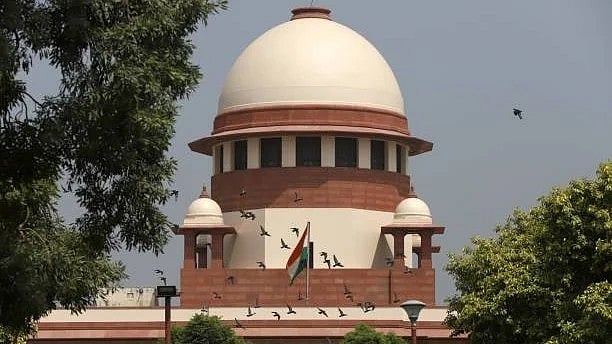
The Supreme Court of India
Credit: iStock Photo
New Delhi: The Supreme Court on Monday sought response from the Central government and others on a plea challenging the validity of a provision of the Income Tax Act which allows political parties to receive "anonymous" cash donations below Rs 2,000.
A bench of Justices Vikram Nath and Sandeep Mehta issued notice also to the Election Commission on a PIL petition filed Khem Singh Bhati.
The court fixed the matter for hearing after four weeks.
During the hearing, the bench asked senior advocate Vijay Hansaria, who appeared for petitioner Bhati, as to why they did not approach the High Court first.
Hansaria said the plea concerned all political parties and the funding to them across the country.
The bench agreed to hear the plea and issued notices to the poll panel, the Centre and others, including several political parties including the BJP and the Congress.
The counsel argued that transparency in political funding has been recognised as a fundamental right of voters in the electoral bonds case and there is huge discrepancy in the income tax returns and contribution reports filed by all the political parties.
Hansaria further argued that exemption from income tax received by the political parties was on the basis that they declared details of all the contributors with PAN numbers and bank details.
In the petition filed by Jayesh K Unnikrishnan, direction has been sought against the Central Board of Direct Taxes (CBDT) to scrutinise the income tax returns and the audit reports filed by political parties under the Income Tax Act, 1961, for the last five years and initiate appropriate proceedings for levy of tax, penalty and prosecution for failure to comply with the requirements of full disclosure, he pointed out.
The counsel argued that with the phenomenal increase in digital payment in India, there is no justification for permitting cash donation up to Rs 2,000. As per the Press Information Bureau on July 28, 2025, in June 2025 alone, UPI transactions were to the tune of Rs 24.03 lakh crores spread over 1,839 crore transactions and in the last six financial years, they were to the tune of Rs 12,000 lakh crore spread over 65,000 crore digital transactions.
"Thus, with the advent of the UPI revolution in the country, political parties should not be allowed to receive cash donations. For example, Bahujan Samaj Party has disclosed nil contribution in its contribution report for the last 18 years and the entire amount has been shown in cash as membership fee," he said.
The plea has also sought a direction to the Election Commission to prescribe as a condition for registration of a political party and allotment of the election symbol that no amount can be received in cash by any political party.
It contended that lack of transparency undermined the purity of the election process as it deprives voters of the crucial knowledge about the source of political funding, including the donors and their motives, preventing them from making a rational, intelligent and fully informed decision while casting their vote.
It also sought direction that the political parties must disclose the name and all other particulars of the person paying any amount of money to it, and no amount can be received in cash so as to maintain transparency in political funding.
The plea sought the striking down of clause (d) of Section 13 A of the Income Tax Act, 1961, as unconstitutional, and also referred to the apex court's 2024 judgment which scrapped the electoral bonds scheme.
Section 13 A of the Act deals with the special provision relating to the income of political parties.
